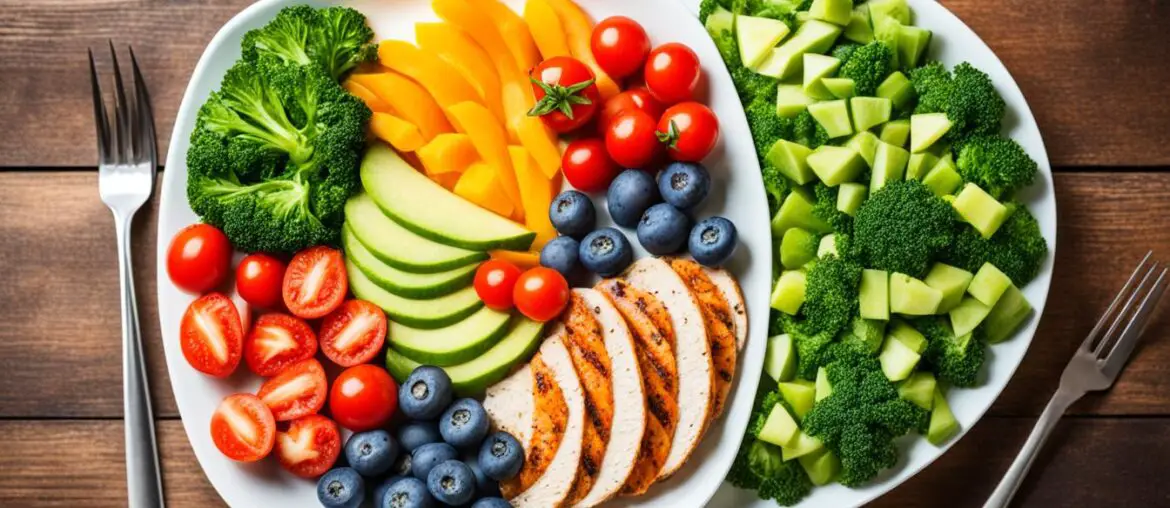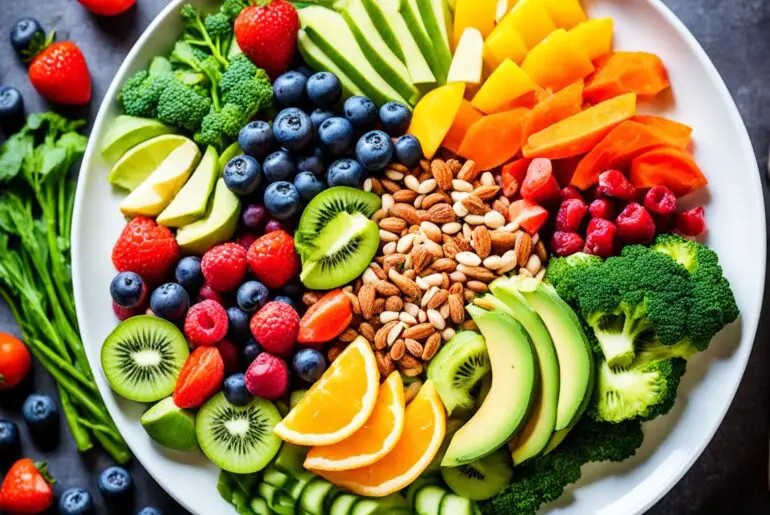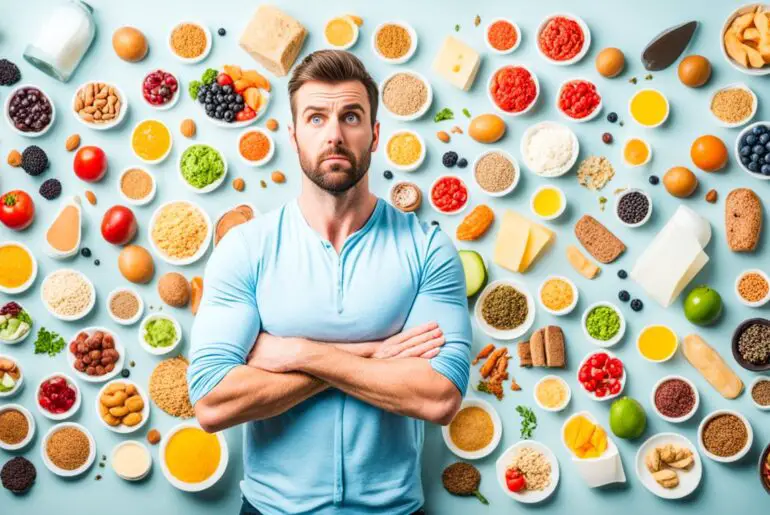Did you know that the HCG diet is one of the most controversial weight loss approaches in recent years? While the promise of rapid weight loss may sound enticing, it is important to understand the correct way to start the HCG diet to ensure safety and effectiveness.
The HCG diet combines the hormone HCG with a very low-calorie diet to achieve significant weight loss. However, multiple studies have shown that the weight loss achieved on the HCG diet is primarily due to extreme calorie restriction rather than the HCG hormone itself.
In this comprehensive guide, I will take you through the various phases of the HCG diet, explain the role of HCG in the body, discuss its effects on weight loss, and provide valuable tips for starting the HCG diet correctly. Let’s dive in!
Key Takeaways:
- Starting the HCG diet correctly is crucial for safety and effectiveness.
- The HCG diet combines HCG hormone supplementation with a very low-calorie diet.
- Studies show that weight loss on the HCG diet is primarily due to extreme calorie restriction.
- The HCG diet is divided into three phases: the loading phase, the weight loss phase, and the maintenance phase.
- Consult with a healthcare professional before starting the HCG diet for personalized advice.
What is HCG and its function in the body?
HCG, or human chorionic gonadotropin, is a hormone produced in high levels during early pregnancy. It plays a crucial role in supporting the production of other essential pregnancy hormones and maintaining the healthy growth of the uterus and fetus.
During the first trimester of pregnancy, the placenta produces a significant amount of HCG, which helps to sustain the pregnancy by supporting the growth of the embryo and the development of the placenta. The presence of HCG in the body also stimulates the production of other hormones, such as progesterone, which is necessary to maintain the pregnancy.
As pregnancy progresses beyond the first three months, the levels of HCG in the bloodstream gradually decrease. By the end of the first trimester, the placenta takes over the production of the hormones necessary for pregnancy, and the role of HCG diminishes.
While HCG is primarily known for its functions during pregnancy, it has also gained attention in the field of weight loss. The HCG diet combines the use of this hormone with a very low-calorie diet to achieve rapid weight loss. However, it is crucial to note that the use of HCG for weight loss purposes is a controversial topic, and its effectiveness and safety are still being debated.
“HCG is a hormone naturally produced during pregnancy. Its role is to support the development of the uterus and fetus by stimulating the production of other important pregnancy hormones.”
Understanding the function of HCG in the body is essential when considering its potential use in weight loss or other non-medical applications. While further research is needed to fully understand the effects and mechanisms of HCG, it is essential to consult with a healthcare professional before considering any treatments or diets involving HCG.
Next, we’ll explore whether HCG truly contributes to weight loss or if it’s primarily the result of calorie restriction on the HCG diet.
Does HCG contribute to weight loss?

While proponents of the HCG diet claim that the hormone boosts metabolism and aids in weight loss, multiple studies have found that the weight loss achieved on the HCG diet is primarily due to extreme calorie restriction, rather than the HCG hormone itself.
“The weight loss achieved on the HCG diet is primarily due to extreme calorie restriction.”
These studies have also concluded that the HCG hormone does not significantly reduce hunger.
Studies Finding:
- Weight loss on the HCG diet is primarily due to extreme calorie restriction.
- The HCG hormone does not significantly reduce hunger.
The findings suggest that achieving weight loss on the HCG diet is largely a result of the significant calorie restriction rather than the influence of the HCG hormone. It is important to note that calorie restriction can lead to weight loss with or without the presence of HCG.
The rules of the HCG diet
The HCG diet consists of three phases: the loading phase, the weight loss phase, and the maintenance phase. Each phase has specific guidelines to follow for optimal results.
Phase 1: The Loading Phase
The loading phase is the initial stage of the HCG diet. During this phase, individuals are encouraged to consume high-fat and high-calorie foods for two days while starting to take HCG hormone supplements or injections. This phase helps prepare the body for the subsequent calorie restriction in the weight loss phase.
Phase 2: The Weight Loss Phase
The weight loss phase is the core of the HCG diet. In this phase, individuals are instructed to consume only 500 calories per day, usually divided into two meals. It is crucial to follow the HCG diet meal plan during this phase. The daily meals should consist of lean protein sources such as chicken, fish, or tofu, along with approved vegetables, fruits, and a serving of bread. It is important to avoid foods high in fats, oils, butter, and sugar during this phase.
Phase 3: The Maintenance Phase
The maintenance phase begins after completing the weight loss phase. During this phase, individuals gradually increase their food intake while still avoiding sugar and starch. It is essential to weigh yourself daily during this phase to ensure weight maintenance. The HCG diet promotes a balanced approach to food choices and encourages the reintroduction of exercise during this phase.
| Phase | Description |
|---|---|
| Phase 1: The Loading Phase | Consuming high-fat, high-calorie foods while starting HCG hormone supplements or injections |
| Phase 2: The Weight Loss Phase | Consume only 500 calories per day with lean protein, vegetables, fruit, and a serving of bread |
| Phase 3: The Maintenance Phase | Gradually increase food intake while avoiding sugar and starch |
Following these rules and phases is essential for the success of the HCG diet. It is important to consult with a healthcare professional or a registered dietitian before starting the HCG diet to ensure it is suitable for individual needs and health conditions.
Scam products on the market
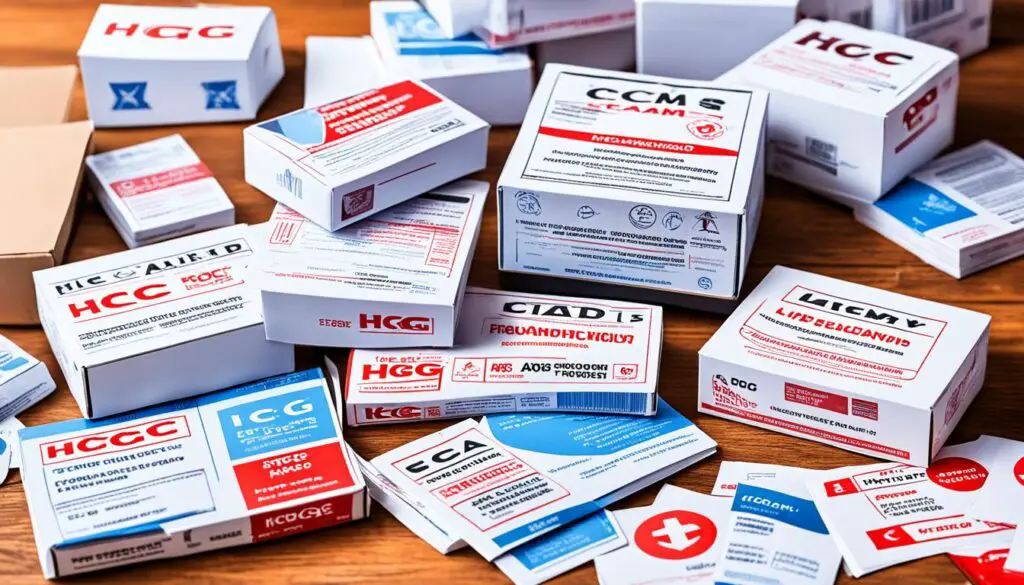
When searching for HCG products online, it is important to be cautious of scams. Many products claim to contain HCG but are labeled as homeopathic and do not actually contain any real HCG. These products are often marketed as alternatives to HCG injections and may come in the form of drops, pellets, or sprays.
It is crucial to understand that only HCG injections, which are available through a prescription, can effectively raise blood levels of HCG. These injections are administered under the supervision of a healthcare professional.
Scam products labeled as homeopathic HCG are not regulated by the FDA and have not undergone the same rigorous testing as prescription HCG injections. Therefore, their effectiveness and safety cannot be guaranteed.
To ensure that you are purchasing genuine HCG products, it is recommended to consult with a healthcare professional or a trusted source. They can provide guidance on legitimate HCG products and help you navigate through the crowded market.
By being aware of these scam products and avoiding them, you can protect yourself from potential risks and ensure that you are using genuine HCG products for your weight loss journey.
Safety and side effects
The safety of the HCG diet and its potential side effects have been a subject of concern and discussion. It is important to note that the FDA has not approved HCG as a weight loss aid, raising questions about its safety and efficacy in this context.
While the HCG diet may lead to rapid weight loss, it is essential to consider the potential side effects associated with this approach. Some individuals may experience headaches, depression, and fatigue while following the HCG diet. In rare cases, blood clots have also been reported.
Given these potential risks, it is advisable to consult with a healthcare professional before starting the HCG diet. They can provide guidance, evaluate individual health conditions, and offer recommendations based on personal circumstances.
“It is important to be aware of the potential side effects and consult with a healthcare professional before embarking on any weight loss program, including the HCG diet.
By seeking professional advice, individuals can better understand the potential risks and benefits of the HCG diet, enabling them to make informed decisions regarding their weight loss journey.
In order to prioritize safety and ensure the best possible outcomes, healthcare professionals can provide personalized guidance and support throughout the dieting process. They can evaluate individual health conditions, monitor progress, and make necessary adjustments to optimize results and minimize potential risks.
HCG Diet Safety Tips:
- Consult with a healthcare professional before starting the HCG diet.
- Be aware of the potential side effects associated with the HCG diet.
- Follow the prescribed dosage of HCG hormone supplements or injections.
- Monitor your health and report any concerning symptoms to your healthcare provider.
- Consider alternative weight loss methods that are recognized as safe and effective.
| Potential Side Effects | Precautions |
|---|---|
| Headaches | Stay hydrated and manage stress levels. |
| Depression | Seek support from friends, family, or a mental health professional. |
| Fatigue | Ensure adequate rest and prioritize self-care. |
| Blood Clots | Report any unusual symptoms such as redness, warmth, or swelling in the legs to a healthcare professional immediately. |
The bottom line on the HCG diet
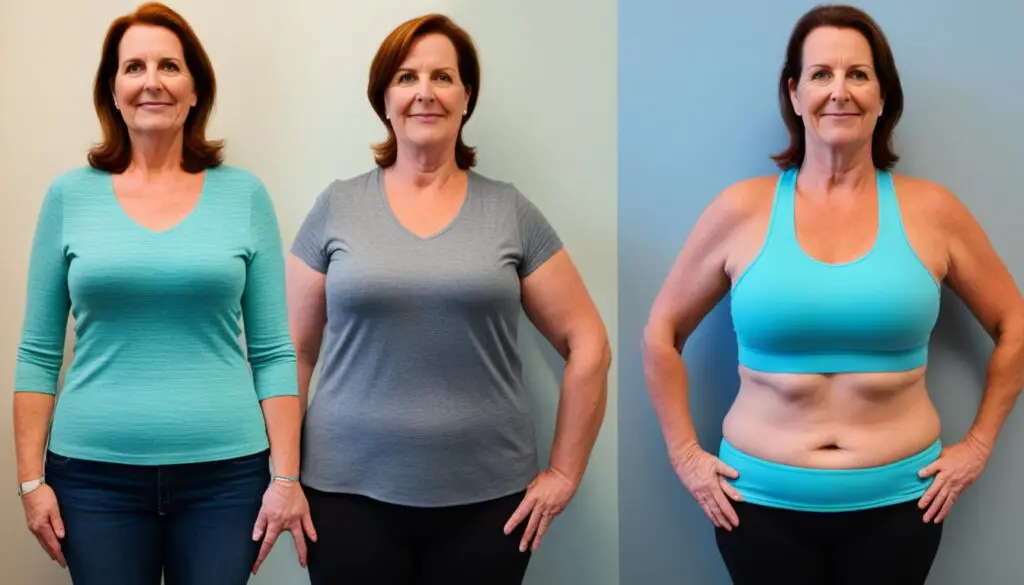
Although the HCG diet may lead to rapid weight loss, its effectiveness is not recognized by health experts. The diet combines extreme calorie restriction with the use of the HCG hormone, but studies have shown that weight loss achieved on the HCG diet is primarily due to the calorie restriction rather than the hormone itself. Additionally, the safety of the HCG diet has been questioned by the FDA.
For individuals looking to lose weight, there are many alternative methods that are safer and more sustainable. It is recommended to consult with a healthcare professional or a registered dietitian to determine the best weight loss approach for individual needs and goals. They can provide personalized guidance and create a plan that is effective and healthy.
| Alternative Weight Loss Methods | Description |
|---|---|
| The Mediterranean Diet | A diet that focuses on whole, unprocessed foods such as fruits, vegetables, whole grains, lean proteins, and healthy fats. It has been shown to promote weight loss and improve overall health. |
| Intermittent Fasting | An eating pattern that involves cycling between periods of fasting and eating. It can help with weight loss by reducing calorie intake and improving insulin sensitivity. |
| Plant-Based Diets | Dietary patterns that emphasize plant foods such as fruits, vegetables, whole grains, legumes, nuts, and seeds. They are not only effective for weight loss but also offer numerous health benefits. |
| Portion Control | A method of managing calorie intake by controlling portion sizes. It allows for flexibility in food choices while still promoting weight loss. |
By exploring these alternative weight loss methods, individuals can find an approach that suits their lifestyle and goals. Remember, it’s important to prioritize long-term health and sustainability rather than opting for potentially unsafe or ineffective strategies like the HCG diet.
Phase 1 – The Start of the HCG Diet

Welcome to phase 1 of the HCG diet, also known as the loading phase. This phase sets the foundation for the subsequent stages of the diet and plays a crucial role in preparing your body for the weight loss phase that follows. During this phase, you will consume high-fat, high-calorie foods while beginning to incorporate HCG hormone supplements or injections into your routine.
The loading phase typically lasts for two days and is designed to help increase your body’s fat stores. By consuming foods rich in fats and calories, you provide your body with the necessary resources to effectively transition into the calorie restriction that characterizes the weight loss phase.
It is important to note that this phase is not a free-for-all. While you are encouraged to indulge in high-fat, high-calorie foods, it is essential to make healthy choices and avoid excessively processed or unhealthy options. Opt for whole foods and nutrient-dense sources of fats, such as avocados, nuts, and seeds.
An effective way to approach the loading phase is by incorporating a variety of macronutrients into your meals. Include sources of protein, healthy fats, and carbohydrates to ensure a balanced diet. This will support your body’s energy levels and help mitigate potential cravings during the subsequent calorie-restricted phase.
During this phase, it is also recommended to stay hydrated by drinking plenty of water. Water plays a crucial role in maintaining overall health and helps flush out toxins from your system. Stay hydrated to support your body’s natural detoxification process.
Remember that the loading phase is only the beginning of your HCG diet journey. It sets the stage for the more intensive weight loss phase that will follow. By properly fueling your body during these initial two days, you are preparing yourself for success in achieving your weight loss goals.
| Protein | Fats | Carbohydrates |
|---|---|---|
| Chicken breast | Avocado | Brown rice |
| Lean beef | Coconut oil | Quinoa |
| Fish | Nuts | Whole wheat bread |
| Eggs | Olives | Legumes |
The loading phase sets the stage for a successful HCG diet journey. By properly fueling your body and incorporating HCG hormone supplements or injections, you are preparing yourself for the subsequent weight loss phase. Stay focused, committed, and consult with a healthcare professional for personalized guidance throughout your HCG diet experience.
Phase 2 – Fat Burn on the HCG Diet
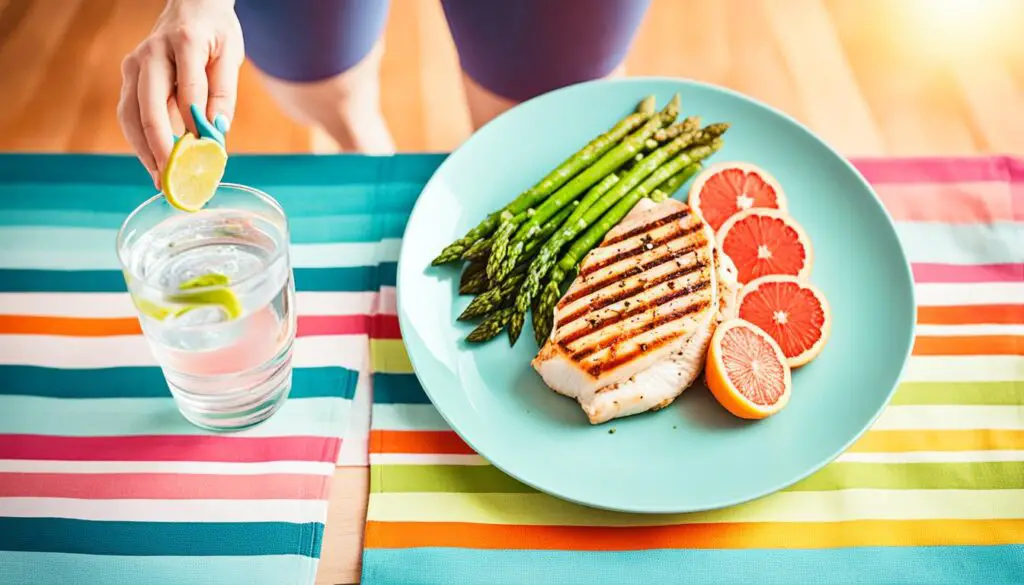
Phase 2 of the HCG diet, also known as the weight loss phase, is a crucial stage in achieving your goals. During this phase, you will consume a very low-calorie diet of only 500 calories per day. This extreme calorie restriction, combined with the continued use of HCG hormone supplements or injections, helps promote fat burn and rapid weight loss.
It is essential to follow the HCG diet meal plan carefully during this phase. Your daily meals should primarily consist of lean protein sources, such as chicken, fish, and lean cuts of beef. These protein options provide your body with the necessary nutrients while keeping the calorie count low.
In addition to lean protein, you can include approved vegetables, fruits, and a serving of bread in your daily menu. These food choices provide important vitamins, minerals, and fiber to support your overall health and well-being.
Remember, portion control is key during phase 2 of the HCG diet. Be diligent in measuring your food and adhering to the recommended serving sizes. This strict adherence to portion control is vital to ensure that you stay within the prescribed calorie limit.
Phase 2 typically lasts for three to six weeks, depending on your weight loss goals and individual progress. It is crucial to consult with a healthcare professional or a registered dietitian to determine the ideal duration for your specific needs.
Sample Menu for Phase 2 of the HCG Diet
Here is a sample menu to give you an idea of what a day on phase 2 of the HCG diet might look like:
| Meal | Food Choices |
|---|---|
| Breakfast | Grilled chicken breast with a side of mixed greens |
| Lunch | White fish fillet with steamed broccoli and a small apple |
| Snack | Sliced cucumber with a tablespoon of vinegar |
| Dinner | Grilled shrimp with roasted asparagus and a slice of whole-grain bread |
Remember to drink plenty of water throughout the day to stay hydrated and support your body’s functions. It is also essential to avoid sugary beverages and high-calorie snacks during phase 2 of the HCG diet.
By sticking to the strict guidelines of phase 2, you can maximize fat burn and achieve your weight loss goals on the HCG diet.
Phase 3 and Beyond – Maintenance on the HCG Diet
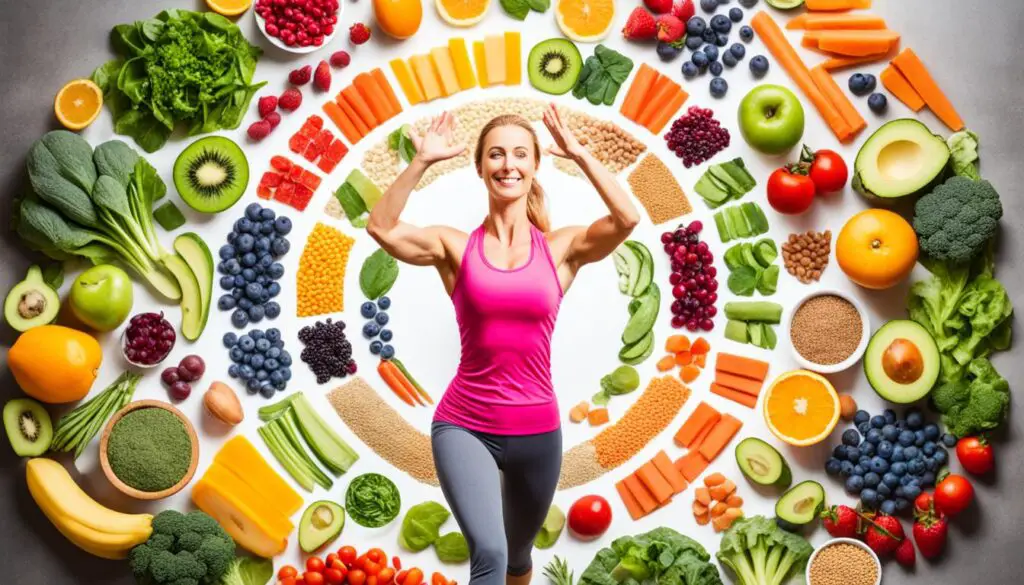
After completing the weight loss phase of the HCG diet, it’s time to transition to phase 3, known as the maintenance phase. This phase is crucial to stabilize your weight and establish healthy eating habits for long-term success.
During phase 3, you’ll gradually increase your food intake while still being mindful of your choices. It’s important to avoid sugar and starch to prevent weight regain and maintain the progress you achieved during the weight loss phase.
To ensure weight maintenance, it’s recommended to weigh yourself daily during phase 3. This allows you to monitor any fluctuations and make necessary adjustments to your diet or activity level.
The HCG diet encourages a balanced approach to food choices. Focus on incorporating lean proteins, fruits, vegetables, and whole grains into your meals. This will provide essential nutrients while keeping your calorie intake in check.
Reintroducing exercise during phase 3 is also recommended. Regular physical activity not only supports weight maintenance but also contributes to overall health and well-being.
Remember, phase 3 is a transition phase that prepares you for the post-diet phase. It’s essential to follow the guidelines and recommendations provided to ensure the best possible outcomes.
The maintenance phase is an opportunity to solidify the positive changes you’ve made during the HCG diet journey. Embrace this phase as a continuation of your commitment to a healthier lifestyle.
Conclusion
The HCG diet is a controversial weight loss approach that combines extreme calorie restriction with the use of the HCG hormone. While some individuals may experience rapid weight loss on this diet, it is not recognized as safe or effective by health experts.
There are many other weight loss methods that are more sustainable and healthier. It is important to consult with a healthcare professional for personalized weight loss advice that takes into account your individual needs and goals.
Remember, achieving and maintaining a healthy weight is a long-term commitment, and it is best approached through a balanced diet, regular physical activity, and positive lifestyle changes. Explore alternative weight loss methods that have been scientifically proven to be safe and effective. Your health and well-being should always be prioritized in your weight loss journey.
FAQ
How do I start the HCG diet correctly?
To start the HCG diet correctly, it is important to understand the three phases of the diet: the loading phase, the weight loss phase, and the maintenance phase. The loading phase involves consuming high-fat, high-calorie foods while starting to take HCG hormone supplements or injections. The weight loss phase requires consuming only 500 calories per day while continuing to take HCG hormone supplements or injections. The maintenance phase involves gradually increasing food intake while avoiding sugar and starch.
What is HCG and what is its function in the body?
HCG, or human chorionic gonadotropin, is a hormone produced in high levels during early pregnancy. Its role is to support the production of other important pregnancy hormones and maintain the healthy growth of the uterus and fetus.
Does HCG contribute to weight loss?
While proponents of the HCG diet claim that the hormone boosts metabolism and aids in weight loss, multiple studies have found that the weight loss achieved on the HCG diet is primarily due to extreme calorie restriction, rather than the HCG hormone itself. These studies have also concluded that the HCG hormone does not significantly reduce hunger.
What are the rules of the HCG diet?
The HCG diet consists of three phases: the loading phase, the weight loss phase, and the maintenance phase. During the weight loss phase, individuals are instructed to consume only 500 calories per day, usually divided into two meals. These meals should include lean protein, vegetables, fruit, and a serving of bread. Certain foods, such as butter, oils, and sugar, should be avoided.
Are there scam products on the market?
Yes, many HCG products available online are labeled as homeopathic and do not contain any real HCG. Only HCG injections, available through a prescription, can raise blood levels of HCG. It is important to be aware of these scam products and avoid them.
What are the safety and side effects of the HCG diet?
The FDA has not approved HCG as a weight loss aid, and they have questioned the safety of the HCG diet and over-the-counter HCG products. Side effects associated with the HCG diet may include headaches, depression, fatigue, and in rare cases, blood clots. It is important to consult with a healthcare professional before starting the HCG diet.
What is the bottom line on the HCG diet?
Although the HCG diet may lead to rapid weight loss, it is not recognized as safe or effective by health experts. There are many other weight loss methods that are safer and more sustainable. It is recommended to speak with a healthcare professional or a registered dietitian to determine the best weight loss approach for individual needs.
What happens during phase 1 of the HCG diet?
Phase 1 of the HCG diet, known as the loading phase, involves two days of consuming high-fat, high-calorie foods while starting to take HCG hormone supplements or injections. This phase is important for preparing the body for the subsequent calorie restriction in the weight loss phase.
What happens during phase 2 of the HCG diet?
Phase 2 of the HCG diet, known as the weight loss phase, involves consuming only 500 calories per day while continuing to take HCG hormone supplements or injections. The daily meals are limited to lean protein, approved vegetables, fruits, and a serving of bread. This phase typically lasts for three to six weeks.
What happens during phase 3 and beyond of the HCG diet?
Phase 3 of the HCG diet, known as the maintenance phase, starts after the weight loss phase and involves gradually increasing food intake while avoiding sugar and starch. It is important to weigh yourself daily during this phase to ensure weight maintenance. The HCG diet encourages a balanced approach to food choices and recommends reintroducing exercise during this phase.

